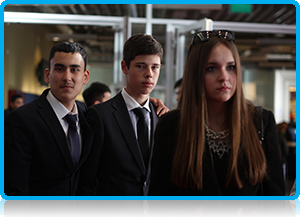Wittenborg Online News!
Wittenborg welcomes students from Moscow and from Epe in Holland!
Wittenborg welcomes students from Moscow and from Epe in Holland!
 Wittenborg welcomes students from Moscow and from Epe in Holland!
Wittenborg welcomes students from Moscow and from Epe in Holland!
Last week a group of 15 Russian students from the High School of Young Politicians, associated with Moscow State University, arrived in Apeldoorn for a week of studies. These students follow a programme known as International Baccalaureate (IB) in which they study their subjects in English. During the week they followed classes in English with Dutch students from the RSG Noord-Oost Veluwe, a duel-language IB school in Epe, to the north of Apeldoorn.
During the week, both Dutch and Russian student paid a joint visit to the Dutch parliament in the Hague, as well as visiting the European headquarters of the international IB centres, which is situated there.
Last Thursday, the students from Moscow and Epe joined a group of students at Wittenborg for a day of workshops and seminars.
On Friday, the Russian students, who have spent the week at the Hotel de Paris in the centre of Epe, also visited the Royal Palace in Apeldoorn. In the weekend the group, having said goodbye to Epe, Apeldoorn and Wittenborg University, spent the day in Amsterdam before leaving for a workshop at the European Parliament in Brussels and sightseeing in the wonderful medieval city of Bruges.
An educational visit of students from a state Russian senior high school to a state school in the Netherlands is an unusual project. Organised by the UK based Study Link Europe, Wittenborg University has facilitated the project. According to Nicky van Riggelen, assistant to the Board of Directors, the visit coincides with an information a

nd promotion drive in Russian speaking countries to promote Wittenborg University and the international degree programmes it offers. “Currently we have 6 Russian speaking students, of a total of around 300 students - we are looking forward to receiving more students from the region in the coming years”
Students from the so-called BRIC countries (Brazil, Russia, India and China) are nowadays often educated in dual speaking schools and are encouraged to study in English and become aware of their chances on the international market, and the advantages that being able to think work and act in English brings to them in their rapidly developing home economies.
One of Wittenborg University’s aims is to offer degree programmes to students from developing countries that will actually help them grow and develop in a way that will make them appreciate, understand and stimulate the similar economic growth taking place in their own countries and around the world.
“Being able to welcome students from schools such as these is an excellent way in which we can promote ourselves, however also international English-taught degrees in Holland and the Netherlands as a study destination, to both the Russian students and the students from Epe”
WUP 5/10/2013
by WUAS Press
©Wittenborg University Press
474 words